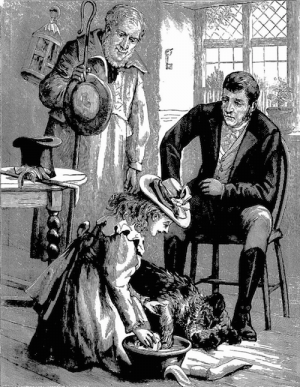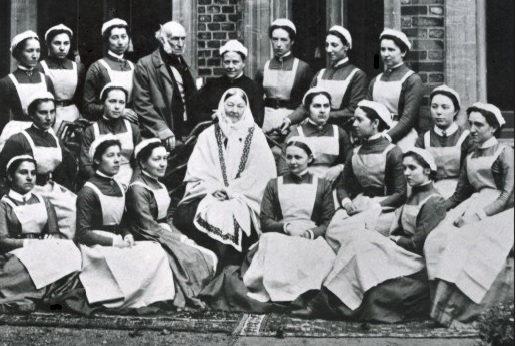
Perspective is everything, but it’s usually shaped by the times in which one lives. At one time, “Flo,” our subject, would have been called an old maid. A few generations later, and we admire her for knowing her own mind, and being unwilling to compromise what she felt was her calling.
It all started with a sheepdog named, “Cap.”
At the age of seventeen, Flo encountered brutality when boys from her town, bored and cruel, started throwing rocks at Cap who’d been sleeping on the doorstep of his own home. One rock damaged his leg so badly that he couldn’t put weight on the foot. This happened in the year 1837, and a dog that couldn’t earn its keep was no good to its owner, particularly if that owner was poor. Cap’s owner, Roger, loved his dog, but he couldn’t survive without a working dog, nor could he afford to feed one that couldn’t do its job.
As it happened, Flo was with a local clergyman when they came upon Roger about to hang Cap with a length of rope. Extremely distressed by the situation, Flo convinced Roger to let her and the cleric at least take a look at Cap and see if anything could be done for him. As Flo held Cap’s head, the clergyman examined the dog’s leg and found no break in the bone. He suggested that hot compresses would cure the bad bruise within in a few days. As he directed, Flo tore up old rags for bandages, boiled them clean, then applied the warm bandages to Cap’s injured leg.
It worked! Cap was back at work within days.
Legend has it that Flo had a dream the next night in which God told her that her mission in life was to heal. Flo had no argument with God on this point, but her father, William, did.
Well educated, intellectually inclined, and very rich as a result of a huge inheritance, William had homeschooled his daughters to an extremely high standard, reproducing the education he, himself, had received at the University of Cambridge. Flo was a polymath with exceptional skills, but William refused to allow her to study nursing at a hospital, so at 23, she started making home visits to help the poor, then reluctantly entered an administrative program where she became an expert on public health and hospitals.
When Flo was 33, she got a job in London in charge of an institution caring for sick women. By now, William realized how unhappy his daughter had been by not following her calling, so he secretly began sending her an allowance that would allow her to be comfortable and independent.
Flo was free.
At her first job, she revolutionized hospital protocol by having hot water piped to every floor, and lifts installed to deliver hot food quickly. She introduced quality control over food, bedding, and equipment. Her nurses were clean, trained, and disciplined, a far cry from the profession’s previous reputation for employing hard women who drank.
And then came the Crimean War.
It was hell on earth percolating with disease and filth. Soldiers were covered in fleas and lice, the wounded having limbs sawn off without anesthetic. The war established Flo. She took a team of 14 hospital nurses, 14 Anglican sisters, and 10 Roman Catholic nuns to Scutari near Istanbul in Turkey. Her passion for caring for the men and improving their circumstances made her legend by the end of the war. She was remembered for carrying a lamp at night as she visited the wounded to give them aid and comfort that she ultimately was nicknamed, “Lady of the Lamp.”
By now, you know that we’re talking about Florence Nightingale, but she was much more than what we’ve shared here. Scientist, analyst, trainer, manager, a pioneer in data visualization, and innovator, her ideas led to the upkeep of sewers, installation of ventilation shafts, putting more space between patients, and seeing to a better diet for them. She made sure walls of hospital wards were washed with lime multiple times a day, and that the land on which hospitals were erected was drained.

Florence Nightingale (middle) in 1886 with her graduating class of nurses from St Thomas’ outside Claydon House, Buckinghamshire/Wikipedia
Nightingale laid the foundation of professional nursing with the establishment of her nursing school at St Thomas’ Hospital in London, the first secular nursing school in the world. She became the first woman to be given the British Order of Merit, and was elected the first female member of the Royal Statistical Society. She also became an honorary member of the American Statistical Association.
And none of this might have happened except for her encounter with a dog.
